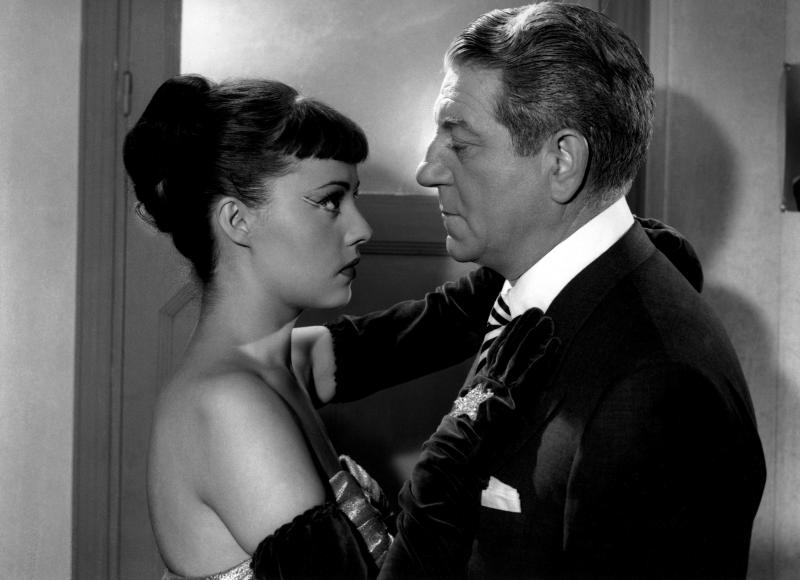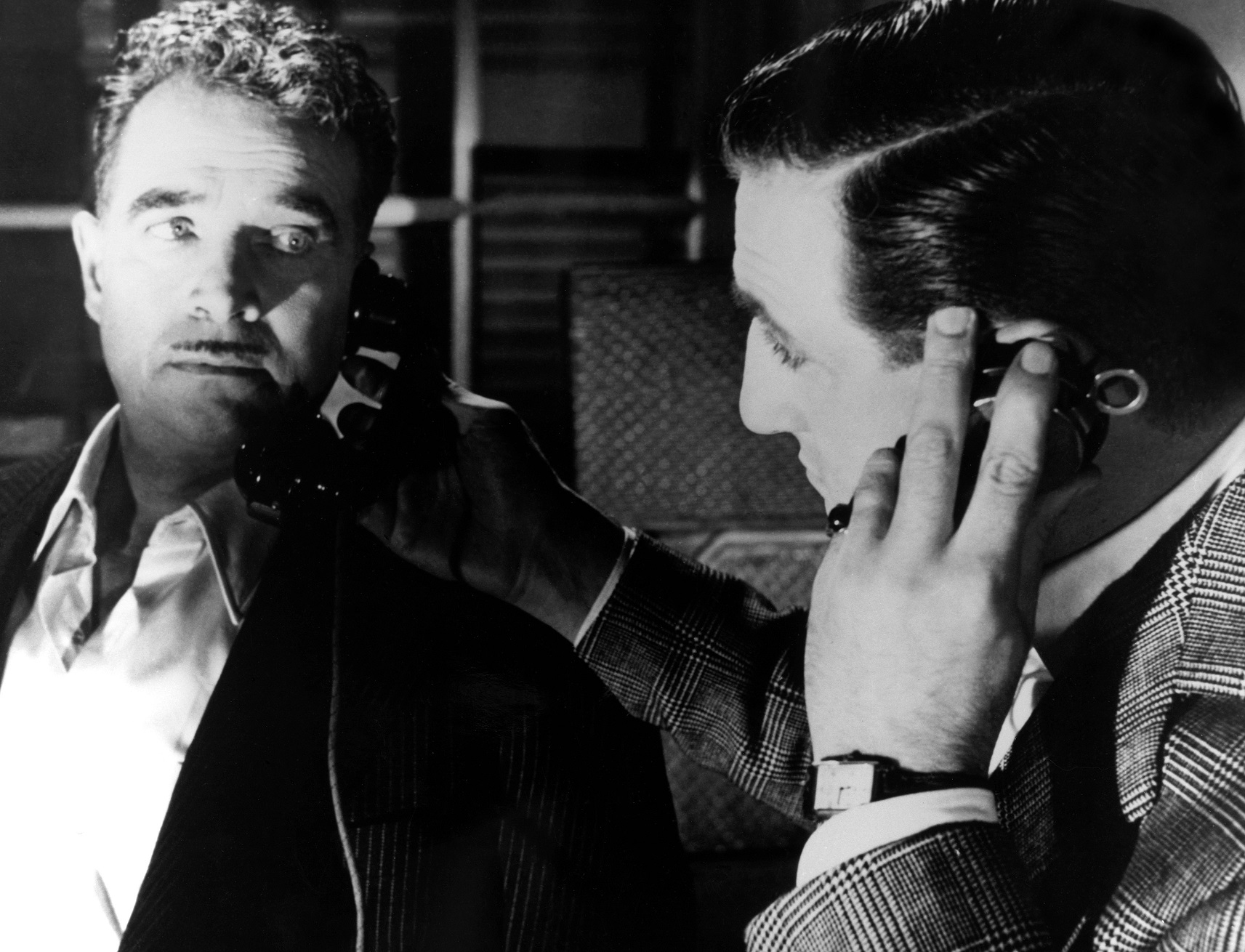DVD/Blu-ray: Touchez Pas au Grisbi | reviews, news & interviews
DVD/Blu-ray: Touchez Pas au Grisbi
DVD/Blu-ray: Touchez Pas au Grisbi
Jean Gabin is majestic in Jacques Becker's French gangster classic

Jean Gabin’s gangster’s paradise says more about him than the bullets he later lets fly. France’s greatest male star made a barnstorming comeback to pre-eminence as sharp-suited, drolly masterful Max in Jacques Becker’s Touchez Pas au Grisbi (1954), after wartime exile and post-war doldrums.
In a surprising, self-sufficient domestic interlude, he opens one of the Champagne bottles that fill his fridge, and carves foie gras for his guest. Then he doles out striped pyjamas, toothbrush and towel, makes up the bed and sofa, and brushes his teeth. Riton’s last rueful gesture at the washbasin is to pull at his jowls. As Max has reminded him, they’re getting old.
There’s a kind of Spartan style and luxury to Max’s secret place, of a piece with his underworld king’s tours of glamorous if shady Pigalle restaurants and clubs. It takes Becker to make this gangster so French, and so revealingly human in the ordinary gestures of bedtime.
 Becker was the first director to be interviewed in Cahiers du cinéma, one of the few old guard heroes to be spared the Nouvelle Vague’s punk-like purge. Studiocanal’s release of his best work, including Edward and Caroline’s UK premiere and Grisbi, confirms him as a humane popular artist of subtle style.
Becker was the first director to be interviewed in Cahiers du cinéma, one of the few old guard heroes to be spared the Nouvelle Vague’s punk-like purge. Studiocanal’s release of his best work, including Edward and Caroline’s UK premiere and Grisbi, confirms him as a humane popular artist of subtle style.
He’d been an assistant to Jean Renoir on his great anti-war Gabin vehicle La Grande Illusion (1937), and insisted on the star’s return for the film which kickstarted the French gangster genre, after the young Gabin’s charming casbah tough-guy prototype in Pepé le Moko (1937).
Much like Clint Eastwood in Unforgiven, the 50-year-old has his cake and eats it here, knowingly conceding his now heavyset figure while retaining his agility, capacity for fierce violence and allure to an enviable array of showgirls and society women (the young Jeanne Moreau included). He’s a softly masterful French male and yet in the film’s last moment, with the cost of his life revealed, Gabin’s face is a profound play of stoic, unstated loss. He’s matched by a cast of strong physical presences in Becker’s Pigalle, and Jean Wiener’s melancholy harmonica theme – like the film, an enormous hit.
Extras include academic Ginette Vincendeau’s knowledgeable analysis, and Jacques Becker’s successful director son Jean recalling working with Gabin and his dad on the film.
rating
Explore topics
Share this article
The future of Arts Journalism
You can stop theartsdesk.com closing!
We urgently need financing to survive. Our fundraising drive has thus far raised £49,000 but we need to reach £100,000 or we will be forced to close. Please contribute here: https://gofund.me/c3f6033d
And if you can forward this information to anyone who might assist, we’d be grateful.

Subscribe to theartsdesk.com
Thank you for continuing to read our work on theartsdesk.com. For unlimited access to every article in its entirety, including our archive of more than 15,000 pieces, we're asking for £5 per month or £40 per year. We feel it's a very good deal, and hope you do too.
To take a subscription now simply click here.
And if you're looking for that extra gift for a friend or family member, why not treat them to a theartsdesk.com gift subscription?
more Film
 theartsdesk Q&A: director Kelly Reichardt on 'The Mastermind' and reliving the 1970s
The independent filmmaker discusses her intimate heist movie
theartsdesk Q&A: director Kelly Reichardt on 'The Mastermind' and reliving the 1970s
The independent filmmaker discusses her intimate heist movie
 Blu-ray: Wendy and Lucy
Down-and-out in rural Oregon: Kelly Reichardt's third feature packs a huge punch
Blu-ray: Wendy and Lucy
Down-and-out in rural Oregon: Kelly Reichardt's third feature packs a huge punch
 The Mastermind review - another slim but nourishing slice of Americana from Kelly Reichardt
Josh O'Connor is perfect casting as a cocky middle-class American adrift in the 1970s
The Mastermind review - another slim but nourishing slice of Americana from Kelly Reichardt
Josh O'Connor is perfect casting as a cocky middle-class American adrift in the 1970s
 Springsteen: Deliver Me From Nowhere review - the story of the Boss who isn't boss of his own head
A brooding trip on the Bruce Springsteen highway of hard knocks
Springsteen: Deliver Me From Nowhere review - the story of the Boss who isn't boss of his own head
A brooding trip on the Bruce Springsteen highway of hard knocks
 The Perfect Neighbor, Netflix review - Florida found-footage documentary is a harrowing watch
Sundance winner chronicles a death that should have been prevented
The Perfect Neighbor, Netflix review - Florida found-footage documentary is a harrowing watch
Sundance winner chronicles a death that should have been prevented
 Blu-ray: Le Quai des Brumes
Love twinkles in the gloom of Marcel Carné’s fogbound French poetic realist classic
Blu-ray: Le Quai des Brumes
Love twinkles in the gloom of Marcel Carné’s fogbound French poetic realist classic
 Frankenstein review - the Prometheus of the charnel house
Guillermo del Toro is fitfully inspired, but often lost in long-held ambitions
Frankenstein review - the Prometheus of the charnel house
Guillermo del Toro is fitfully inspired, but often lost in long-held ambitions
 London Film Festival 2025 - a Korean masterclass in black comedy and a Camus classic effectively realised
New films from Park Chan-wook, Gianfranco Rosi, François Ozon, Ildikó Enyedi and more
London Film Festival 2025 - a Korean masterclass in black comedy and a Camus classic effectively realised
New films from Park Chan-wook, Gianfranco Rosi, François Ozon, Ildikó Enyedi and more
 After the Hunt review - muddled #MeToo provocation
Julia Roberts excels despite misfiring drama
After the Hunt review - muddled #MeToo provocation
Julia Roberts excels despite misfiring drama
 London Film Festival 2025 - Bradley Cooper channels John Bishop, the Boss goes to Nebraska, and a French pandemic
... not to mention Kristen Stewart's directing debut and a punchy prison drama
London Film Festival 2025 - Bradley Cooper channels John Bishop, the Boss goes to Nebraska, and a French pandemic
... not to mention Kristen Stewart's directing debut and a punchy prison drama
 Ballad of a Small Player review - Colin Farrell's all in as a gambler down on his luck
Conclave director Edward Berger swaps the Vatican for Asia's sin city
Ballad of a Small Player review - Colin Farrell's all in as a gambler down on his luck
Conclave director Edward Berger swaps the Vatican for Asia's sin city
 London Film Festival 2025 - from paranoia in Brazil and Iran, to light relief in New York and Tuscany
'Jay Kelly' disappoints, 'It Was Just an Accident' doesn't
London Film Festival 2025 - from paranoia in Brazil and Iran, to light relief in New York and Tuscany
'Jay Kelly' disappoints, 'It Was Just an Accident' doesn't

Add comment